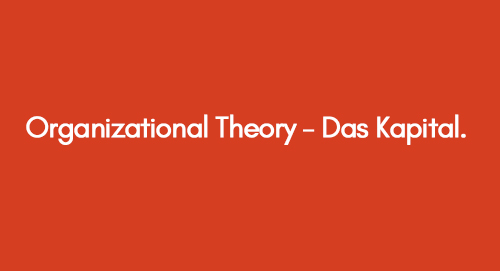Introduction:
Karl Marx has been known as a multi dimensional social thinker, a historian, a revolutionist for the socialist and the communist regime, and a social scientist in its very essence. His work did not gain popularity until after his death in 1883, but the socialist movement had been inspired by his theories and ideas on politics, socialism and economics, also known as Marxism.
Marxism is a collection of ideas or theories which state that the development of human beings and their societies depends solely on the language of struggle between the two classes, namely the working middle class and the ruling elite. He further draws a distinction between the two classes by stating that the working middle class is the one that provides the labor, whereas the elite is the one who is in control of the organization and production. He terms this relationship as dictatorship and reinstates his equality for all classes by emphasizing that this capitalist system would soon be replaced by the movement socialism whereby the working middle class elite would be the rulers. He has through his work, highlighted various problems with the capitalist regime, one of which is that it is an illustration of the ruling elite and policies made to benefit them only. The capitalist system as predicted led to its own self destruction through socio economic variations and in time gave into the socialist regime which subsequently gave in to the communist regime (Marx, 1875.)
Calhoun, 2002, in his biography about Karl Marx, stated that Marx was an activist who being a proponent of revolution, was always an ally of the social theorist as well as the working middle class or underprivileged so that they could be encouraged to bring down capitalist regime through an organized revolution in favor of their own rights and policies.
Marx’s legacy is considered to be entrenched within the history of twentieth century (Wheen, 2001). Francis Wheen, Marx’s noted biographer, illustrated through an array of examples of social theorists regarding what actually constituted Marxism and its legacy. According to Calhoun, 2002, pointed out that the reasons for Marxism to have gained such immense popularity is because they highlight the ideas of critique against the current capitalist nature of the society and work for a change from this regime. Freud and Paul, 1970, on the other hand regard Marx as one of the founders of school of suspicion, such that he used his suspicion to question what did not seem right to him. Singer on the other hand notes that Marxism, brought about modern ambits of social sciences, whereby effecting arts, philosophy, psychology, literature and geography.
Despite the cohesive dubbing of all of the theoretical ideas and notions of Marx into one body known as Marxism, there is successive debate amongst his followers regarding the correct interpretation and application of the theories.
Taken from one of the earliest manuscripts regarding politics and economics by Marx, in 1844 (Marx & Engles 1888), this notion correctly summaries the approach that has been undertaken by Marx and his subsequent followers: First and foremost, under the capitalist regime, the class difference between the poor and the rich is so intrinsically bonded within the society that despite the labor of the middle class, it is the rich that becomes richer and the poor decreases in status and wealth, being treated as a cheap commodity that may be disregarded when time may come. Also with the subsequent increase in the things produced by the working class their value decreases.
Das Kapital- Introduction:
Das Kapital, also known as Das Kapital: Kritik der politischen Ökonomie in German or in English as; Capital: Critique of Political Economy, comprises of three distinct volumes which focus on a variety of topics on political economy, including societal problems as well as connections to history. Written by two authors, Friedrich Engels and Karl Marx, it is mostly called Das Kapital in the short form rather than using the English or German full name.
Within the book, the most intrinsically entrenched notion is the pros and cons of the capitalist systems with a focus on its functioning within the society. Marx’s opinion about the capitalist movement seems to go around the notions and function of commodities within societies and capitalist regimes, through a capitalist worker’s view point and relationship through wages amongst other things. He focuses on the nature of capitalism by highlighting the various exploitative policies to benefit the elite and deprive those who are less fortunate which subsequently leads to non sustainability of the regime through profit which has no proper implementation or application.
-
Rationale:
The class struggle is every bit apparent today as it was at that time, and it is to highlight this particular facet of the capitalist governing society that Marx wrote the book. In the introduction described above, the basic notions that Marx describes in his book have been highlighted, such as commodities, the structure of capitalist community, various recession and progression of economic crisis’s and the criticism of political economy- capitalism, through various weaknesses and contradictions of the system.
B] Insight into Das Kapital:
Volume 1: The Process of Production of Capital.
Volume 1 of the three series book begins with an insightful discussion of three different terms: commodity, exchange and money. The theoretical discussion about the three facets is constantly illustrated through an example about one average citizen buying a coat which is 20 yards of linen cloth. However, this example illustrates the current capitalist nature of the society today, whereby buying a coat in that time, today, is equivalent to the purchase of a house or a car (Galbraith, 1977).
The first volume highlights the mode of production in both capitalist and socialist regime and an in depth class struggle problem which has been prevalent within the regime. Marx through different chapters within the book highlights the policies and mechanisms that have been put into place to only benefit the ruling elite and to disregard the value of the working class. These various chapters include wages, labor power, surplus values, means of circulation of money etc.
Terms and Ideas:
Marx has throughout his book introduced a multitude of ideas and arguments with the first book being an inference of exploitation and the capitalist economic theory through interdependence between capital and power of labor. Through these arguments he has invariably brought about astounding ideas which must be looked into before the analysis of each of the further basic fundamentals of the organizational structure mentioned can be studied.
By introducing the socialist and the capitalist mode of production theories, Marx refers to the factories or raw materials as modes whereas the relation and production paradigm introduced further in the book refers to the relationship between the ruling elite and the working class. He further emphasizes the notion of alienation that middle class workers may suffer from due to exploitation they have suffered through the hands of ruling elite in the name of capital, and this alienation is the consequence of not being able to have access to a product made by oneself in the name of capital or money.
Marx saw the history to be a succession of failed capitalist economic policies that will lead to collapse of the regime. The notion of labor linked with commodity again describes the value of labor power in the eyes of the ruling elite who simply exploit it for their own benefit and satisfaction of needs.
Most importantly, the organization of the society is such that fetishism, within the society is present in the form of accumulation of money. This money is in turn leading to the acquiring of capital under which the poor becomes poor and the rich just becomes richer.
-
Commodities.
Marx, in his book, describes a commodity as the capacity of usefulness that an object may have for the satisfaction of human desires and needs. The usefulness can not only be determined through a use value capacity but also through an exchange value capacity also and all of these are measurable in the same unit that is money. Marx in his discussion brings about the determinants of this value of money through commodities, namely that different variations of commodities cannot be measurable with the same unit regardless of the quantification, and expresses this measurable quantification in terms of the labor output, which in turn is described as an exploitation mechanism used by the ruling elite. In his chapter on Fetishism, Marx elaborates the notion of commodities linked to labor; such that is reflects not only the quantification of labor but also the interdependence of production and labor for the manufacturing of a certain service or object.
Marx emphasizes that since commodities are both exchange value and use value, with the former not being essential to the notion of object of commodities, but it is in fact dependent upon the division of labor within the society and therefore causes an interdependent relationship to come into play. This theory was also proposed by David Ricardo who essentially linked together the labor power and the price of a certain commodity through a proportional increase or decrease relationship. However, Marx forwards this theory by Ricardo, through stating that this proportional interdependence is not as simple as it is thought to be, and simply it is an expression of exploitation through private ownership of the ruling elite and therefore responsible for the subsequent social consequences of the inner turmoil that result from this private ownership.
Exploitation and Capital.
Commodities are constantly being converted to money which in turn is converted into capital, which in Marx’s opinion is the money which is used to obtain more money. Within the capitalist regime, capital is not seen as a means of obtaining commodities but in fact it is seen as a way of personal benefit and fulfillment of one’s own individual needs. The ruling elite in order to prosper and increase their capital, engage the middle class working labor who then are exploited in the name of capital to be obtained by the elite. Labors and working class are in turn treated as commodities, being sold off for personal benefit(Spark Notes Editors, 2005) . This theory or notion of capitalism, ruling elite and the exploitation through capital, as Marx sees it eventually leads to the inner turmoil of the system and subsequent collapse. He showed through his own example during exile, that poverty and disregard to the working middle class was and is a permanent feature of the capitalist regime.
Exchange Value.
Within his book, Marx has given an illustration of an average citizen, working class, buying a coat. He explains the unified exchange value of the commodities in terms of need and desires. Such that for a coat, comprising 20 yards of linen, the exchange value could come up to about 10lbs of tea, 1 quarter of corn, 2 ounces of gold and so forth. The interrelated intrinsic nature of the relative and equivalent form of commodities and their exchange value is dependent upon the changing needs and wants of humans and the capitalist society surrounding us.
Capital: Volume II. The Process of Circulation of Capital.
The second part of the book was written by Friedrich Engles, through the notes left by Marx. This volume seems to have taken the arguments a step further then in Volume I, whereby stating that a trade cycles exists within the capitalist regime (Marx, 1907), through the labor who is producing the goods for the ruling elite, the latter who then sells it off and the middle class labor then acting as consumers to buy the products produced by themselves. The book also highlights an unstable equilibrium between the production of the commodities and the supply of the same between the two classes.
-
Capital: Volume III. The Process of Capitalist Production as a Whole.
The book Das Kapital is known best for its work and analogies laid down in Volume III. The book is essentially divided into seven parts, which focus on the inter relationship between the production costs or requirements and the profit (Marx, 1959). The theory is that with the increase in production requirements the profit decreases, thereby making the two facets inversely proportional. This difference or inverse proportionality is said to be prevalent because of the capitalist regime and the unfair policies which clearly draw a distinction between the class struggles of the working middle class and the ownership of the ruling elite. The surplus value and the profits have been discussed in detail within the book which states the role of circulation in realization of the surplus value. Such that the employment of workers inevitable means employment of machinery or raw materials that may be used in the production process, however, the real profit or surplus value is only realized once the product is within the market and in the hands of the consumers- the working middle class (Marx, 1959).
-
Critical analysis:
According to Marx, the capitalist regime with its faults has been in practice since centuries not just through a systematic trade cycle or a concise pattern of industries prevalent today but even before this, when the lending of commodities or when a merchant would but a commodity for a small amount of money from vendors, in turn bringing about exploitation through less payment for a service and accumulation of capital with the merchant, the elite.
This book on Das Kapital can be seen as a means of providing a thorough analysis and definition of the capitalist mode of production. The mean of production and consumption are linked together through the notions of trade cycle, whereby, production is ensued by the labor working class on the initiation of the elite who own the production, and then the consumption is in turn through the same class that has produced the commodities which result in an unstable accumulation of wealth and commodities amongst the two different classes. The profit gained through this trade cycle, is in turn used to gain money, thus terming it as a capitalist regime.
The society is concerned with accumulation of wealth, not for the betterment of the society as a whole but only for one self (Kapital, 2002). There is no ethical code of conduct which may provide protection to those who are unpaid or exploited in the face of capital and employment; however Marx, through an analysis of the capitalist regime has brought about the later revolutions that he had always favored.
Marx being a proponent of the revolution against the ruling elite wanted a massive accumulation of the working class which would to bring about the socialist regime which in turn would give in to the communist regime. The book by Marx and later by Engles, is a complete insight into the modern economic organizational theory, which is prevalent today in industries, and in the relationship between the distinct class struggle. The applicability of Das Kapital today to the capitalist regime found within a modern economic society reinstates the Marxist principles that policies are entrenched within the system to reinforce the power of the ruling elite and disregards the value of the working class.
References:
- Alvarado, M., Gutch, R, and Wollen, T., (1987). Learning the Media: Introduction to Media Teaching, Palgrave Macmillan.
- Analysis on Marx’s Conception of History, (2013). Based on: Das Kapital. Available online at: <http://www.economics-papers.com/analysis-on-marxs-conception-of-history-which-based-on-das-kapital.html> [Accessed 19th March 2013].
- Andersen, H. and Kaspersen, L., (2000). Classical and modern social theory. Wiley-Blackwell. pp. 123. ISBN 978-0-631-21288-1.
- Calhoun, C., (2002). Classical sociological theory. Wiley-Blackwell. pp. 23–24. ISBN 978-0-631-21348-2.
- Forrest, B., Kauffman, W., (2008). From Plato to Derrida. Upper Saddle River, New Jersey: Pearson Prentice Hall. pp.373-377, PP 527, 529. ISBN 0-13-158591-6.
- Galbraith, J.K., (1977). The Age of Uncertainty. London: BBC. Andre Deutsch, ISBN 0-563-12887-9
- Kapital, D., (2002). Explains and analyzes Karl Marx's: Das Kapital Reccomends book to future students of my economics class. Available online at: <http://www.writework.com/essay/das-kapital-explains-and-analyzes-karl-marx-s-das-kapital> [Accessed 19th March 2013].
- Marx, K., (1875). Critique of the Gotha Program (Marx/Engels Selected Works, Volume Three, pp.13–30.
- Marx, K., (1867). Capital: A critique of political economy. Volume I. Book one. The Process of production of capital. Progress Publishers, Moscow, USSR.
- Marx, K., (1907). Capital: A critique of political economy. Volume II. Book one. The Process of circulation of capital. Progress Publishers, Moscow, USSR.
- Marx, K (1959). Capital: A critique of the political economy. Volume III. Book one. The process of capitalist production as a whole. Institute of Marxism-Leninism, USSR. International Publishers, NY.
- Marx, K. and Engles, F., (1888). The Communist Manifesto
- Paul, R.F., (1970). Philosophy: An Essay on Interpretation. New Haven and London: Yale University Press, 1970, pp. 32
- SparkNotes Editors, (2005). SparkNote on Karl Marx (1818–1883). Available online at: <http://www.sparknotes.com/philosophy/marx/> [Retrieved March 18, 2013]
- Wheen, F., (2001). Karl Marx- A Life. W.W Norton & Company, Reprint edition.





















